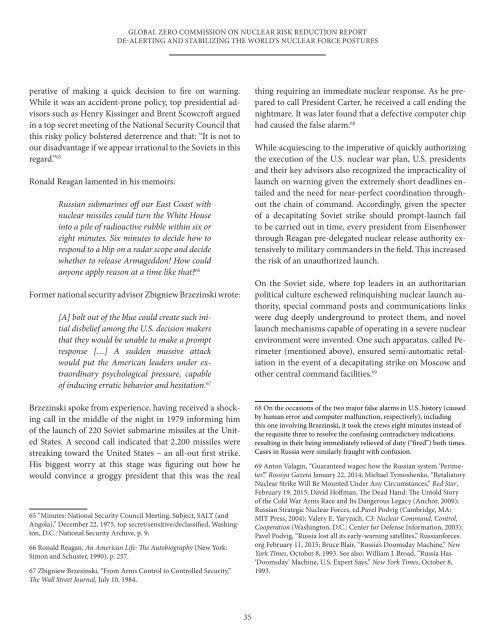global_zero_commission_on_nuclear_risk_reduction_report
global_zero_commission_on_nuclear_risk_reduction_report
global_zero_commission_on_nuclear_risk_reduction_report
You also want an ePaper? Increase the reach of your titles
YUMPU automatically turns print PDFs into web optimized ePapers that Google loves.
GLOBAL ZERO COMMISSION ON NUCLEAR RISK REDUCTION REPORTDE-ALERTING AND STABILIZING THE WORLD’S NUCLEAR FORCE POSTURESperative of making a quick decisi<strong>on</strong> to fire <strong>on</strong> warning.While it was an accident-pr<strong>on</strong>e policy, top presidential advisorssuch as Henry Kissinger and Brent Scowcroft arguedin a top secret meeting of the Nati<strong>on</strong>al Security Council thatthis <strong>risk</strong>y policy bolstered deterrence and that: “It is not toour disadvantage if we appear irrati<strong>on</strong>al to the Soviets in thisregard.” 65R<strong>on</strong>ald Reagan lamented in his memoirs:Russian submarines off our East Coast with<strong>nuclear</strong> missiles could turn the White Houseinto a pile of radioactive rubble within six oreight minutes. Six minutes to decide how toresp<strong>on</strong>d to a blip <strong>on</strong> a radar scope and decidewhether to release Armagedd<strong>on</strong>! How couldany<strong>on</strong>e apply reas<strong>on</strong> at a time like that? 66Former nati<strong>on</strong>al security advisor Zbigniew Brzezinski wrote:[A] bolt out of the blue could create such initialdisbelief am<strong>on</strong>g the U.S. decisi<strong>on</strong> makersthat they would be unable to make a promptresp<strong>on</strong>se […] A sudden massive attackwould put the American leaders under extraordinarypsychological pressure, capableof inducing erratic behavior and hesitati<strong>on</strong>. 67Brzezinski spoke from experience, having received a shockingcall in the middle of the night in 1979 informing himof the launch of 220 Soviet submarine missiles at the UnitedStates. A sec<strong>on</strong>d call indicated that 2,200 missiles werestreaking toward the United States – an all-out first strike.His biggest worry at this stage was figuring out how hewould c<strong>on</strong>vince a groggy president that this was the real65 “Minutes: Nati<strong>on</strong>al Security Council Meeting, Subject, SALT (andAngola),” December 22, 1975, top secret/sensitive/declassified, Washingt<strong>on</strong>,D.C.: Nati<strong>on</strong>al Security Archive, p. 9.66 R<strong>on</strong>ald Reagan, An American Life: The Autobiography (New York:Sim<strong>on</strong> and Schuster, 1990), p. 257.67 Zbigniew Brzezinski, “From Arms C<strong>on</strong>trol to C<strong>on</strong>trolled Security,”The Wall Street Journal, July 10, 1984.thing requiring an immediate <strong>nuclear</strong> resp<strong>on</strong>se. As he preparedto call President Carter, he received a call ending thenightmare. It was later found that a defective computer chiphad caused the false alarm. 68While acquiescing to the imperative of quickly authorizingthe executi<strong>on</strong> of the U.S. <strong>nuclear</strong> war plan, U.S. presidentsand their key advisors also recognized the impracticality oflaunch <strong>on</strong> warning given the extremely short deadlines entailedand the need for near-perfect coordinati<strong>on</strong> throughoutthe chain of command. Accordingly, given the specterof a decapitating Soviet strike should prompt-launch failto be carried out in time, every president from Eisenhowerthrough Reagan pre-delegated <strong>nuclear</strong> release authority extensivelyto military commanders in the field. This increasedthe <strong>risk</strong> of an unauthorized launch.On the Soviet side, where top leaders in an authoritarianpolitical culture eschewed relinquishing <strong>nuclear</strong> launch authority,special command posts and communicati<strong>on</strong>s linkswere dug deeply underground to protect them, and novellaunch mechanisms capable of operating in a severe <strong>nuclear</strong>envir<strong>on</strong>ment were invented. One such apparatus, called Perimeter(menti<strong>on</strong>ed above), ensured semi-automatic retaliati<strong>on</strong>in the event of a decapitating strike <strong>on</strong> Moscow andother central command facilities. 6968 On the occasi<strong>on</strong>s of the two major false alarms in U.S. history (causedby human error and computer malfuncti<strong>on</strong>, respectively), includingthis <strong>on</strong>e involving Brzezinski, it took the crews eight minutes instead ofthe requisite three to resolve the c<strong>on</strong>fusing c<strong>on</strong>tradictory indicati<strong>on</strong>s,resulting in their being immediately relieved of duty (“fired”) both times.Cases in Russia were similarly fraught with c<strong>on</strong>fusi<strong>on</strong>.69 Ant<strong>on</strong> Valagin, “Guaranteed wages: how the Russian system ‘Perimeter’,”Rossiya Gazeta January 22, 2014; Michael Tymoshenko, “RetaliatoryNuclear Strike Will Be Mounted Under Any Circumstances,” Red Star,February 19, 2015; David Hoffman, The Dead Hand: The Untold Storyof the Cold War Arms Race and Its Dangerous Legacy (Anchor, 2009);Russian Strategic Nuclear Forces, ed.Pavel Podvig (Cambridge, MA:MIT Press, 2004); Valery E. Yarynich, C3: Nuclear Command, C<strong>on</strong>trol,Cooperati<strong>on</strong> (Washingt<strong>on</strong>, D.C.: Center for Defense Informati<strong>on</strong>, 2003);Pavel Podvig, “Russia lost all its early-warning satellites,” Russianforces.org February 11, 2015; Bruce Blair, “Russia’s Doomsday Machine,” NewYork Times, October 8, 1993. See also: William J. Broad, “Russia Has‘Doomsday’ Machine, U.S. Expert Says,” New York Times, October 8,1993.35


